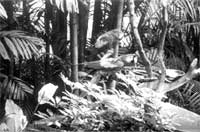COSTA RICA
 Illegal trade in wildlife is threatening Costa Rica's biodiversity. The most sought after species are the limpets, parrots, jaguar cubs, toucans, squirrel monkeys and tropical fish. "We don't have the resources to control the illegal trade,' said Juan Rodriguez, a biologist with the country's ministry of environment and energy. According to him, most of the arrested traffickers are set free after they pay a minimal fine ranging between us $156-312. He opines that the small amount of fine encourages the illegal trade.
Illegal trade in wildlife is threatening Costa Rica's biodiversity. The most sought after species are the limpets, parrots, jaguar cubs, toucans, squirrel monkeys and tropical fish. "We don't have the resources to control the illegal trade,' said Juan Rodriguez, a biologist with the country's ministry of environment and energy. According to him, most of the arrested traffickers are set free after they pay a minimal fine ranging between us $156-312. He opines that the small amount of fine encourages the illegal trade.
Related Content
- Measures to enhance forest conservation and reduce deforestation: viewpoints and lessons from producing countries
- Sector coupling in facilitating integration of variable renewable energy in cities
- Renewable energy policies for cities: experiences in China, Uganda and Costa Rica
- Truck eco-driving programs: Current status in Latin America and international best practices
- Driving system shifts for climate resilience: case studies of transformative adaptation in Bhutan, Ethiopia, and Costa Rica
- Building a climate resilient future for Costa Rica’s coffee farming communities
